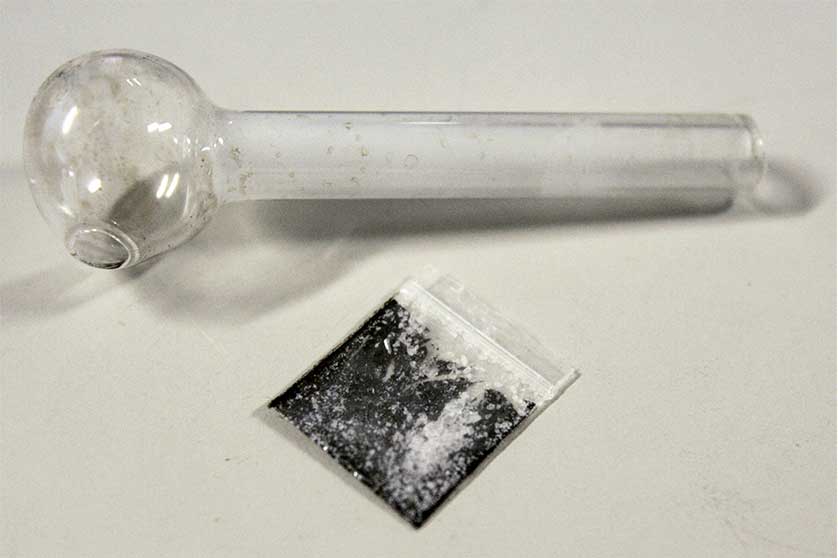Smoking Meth | Side Effects, Dangers, & Treatment

Medically Reviewed By: Kimberly Langdon, M.D.
Smoking methamphetamine allows the drug to enter your bloodstream quickly, causing immediate and intense euphoric side effects as well as concerning health dangers that range from dry mouth to lung damage.

Methamphetamine is a prescription drug used to help treat those struggling with attention deficit hyperactivity disorder (ADHD) or narcolepsy by stimulating the central nervous system (CNS) and interacting with the neurotransmitter dopamine.
However, due to the fact that meth is an addictive drug, many choose the illicit drug market to purchase the substance for misuse.
This form of methamphetamine may be crystalized to resemble a white powder. Known as crystal methamphetamine or crystal meth, or in slang terms “tina,” methamphetamine is a dangerous drug that can cause a number of severe side effects.
As a Schedule II drug on the controlled substance list, this stimulant drug is habit-forming and can lead to crystal meth addiction. Methamphetamine use can cause a number of life-threatening health concerns when abused, especially if a person is snorting or smoking the substance.
Those who smoke meth may do so by using a glass pipe and smoking the crystalized form of meth. This form of meth use creates severe side effects and dangers.
Side Effects Of Smoking Meth
Smoking meth is a serious form of substance use which can create life-threatening side effects.
Short-Term Side Effects
Immediate and short-term side effects of meth may include feelings of euphoria, increased wakefulness, and extra energy. Due to the nature of the drug and how it affects dopamine in the brain, a person may experience a “binge” and “crash” pattern.
The short-term effects of methamphetamine likely consist of:
- a rush of euphoria
- coughing
- dry mouth
- irregular heart rate
- decrease in appetite
- high body temperature
- fast breathing
Long-Term Side Effects
Long-term use of meth can lead to chronic conditions, methamphetamine addiction, and life-threatening health problems. According to the Substance Abuse and Mental Health Services Administration (SAMHSA), long-term effects of methamphetamine abuse can include:
- weight loss
- tooth decay, sometimes known as “meth mouth”
- severe psychosis including hallucinations
- mood swings including sudden and violent behavior
- withdrawal symptoms
- extreme itching
- insomnia
- lung damage
- difficulty breathing
- chronic coughing
- confusion
Dangers Of Smoking Meth
First time use of methamphetamine can result in a meth overdose. In addition to this, there are other dangers associated with smoking meth, including uncomfortable withdrawal symptoms when you stop use.
Withdrawal Symptoms
Some of the symptoms of meth withdrawal, according to the National Institute on Drug Abuse (NIDA), can include:
- severe cravings for the drug
- fatigue
- depression
- anxiety
- increase in appetite
- sleeping problems
Meth Overdose
Those who abuse meth by smoking the drug in large quantities, combining it with other drugs, or participating in chronic meth use may increase the risk of overdose.
A meth overdose may result in sudden death. Some of the symptoms of a meth overdose may consist of:
- seizures
- high blood pressure
- heart attack
- stroke
- respiratory depression
- severe paranoia
- coma
A meth overdose can result in a heart attack or brain damage. Contact 911 immediately if an overdose is suspected.
Snorting Or Injecting Meth
If a person has developed a drug addiction, they may turn to other drugs or use larger amounts of the same drug they currently take. Others may turn to alternative routes of administration besides smoking meth.
For instance, a person injecting meth can develop diseases such as hepatitis or HIV if the needles shared are contaminated. Blood clots, bacterial infections, and collapsed veins may also occur.
Snorting meth can create infections in the mucous membranes, creating a deviated septum. This can also cause nosebleeds and a chronic runny nose.
Meth Addiction Treatment
At Ohio Recovery Center, we address patterns of problematic drug use in an inpatient setting with treatment options such as medical detox, individual and group therapy, and ongoing aftercare support.
To find out if our meth addiction treatment program is the right fit for you or a loved one, please contact us today.
- National Institute on Drug Abuse — What are the Long-Term Effects of Methamphetamine Misuse? https://nida.nih.gov/publications/research-reports/methamphetamine/what-are-long-term-effects-methamphetamine-misuse
- National Institute on Drug Abuse — What are the Short-Term Effects of Methamphetamine Misuse? https://nida.nih.gov/publications/research-reports/methamphetamine/what-are-immediate-short-term-effects-methamphetamine-misuse
- National Institute on Drug Abuse — What is Methamphetamine? https://nida.nih.gov/publications/drugfacts/methamphetamine
- National Library of Medicine: MedlinePlus — Methamphetamine https://medlineplus.gov/methamphetamine.html
- Substance Abuse and Mental Health Services Administration (SAMHSA) — Know the Risks of Meth https://www.samhsa.gov/meth

